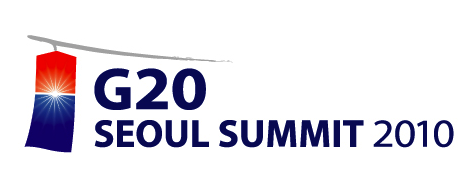So much for the G20's agreement to agree on currencies. South Korea, Indonesia, Columbia, Thailand, Brazil and now Europe and South Africa are all bitching about the strength of their currencies.
Every Man for Himself
Bloomberg says it's ʻEvery Man for Himselfʼ on Currencies After G-20
Wednesday, October 27, 2010 .
Finance chiefs from South Korea to South Africa signaled they may act to slow gains in their currencies, just four days after the Group of 20 vowed to soothe trade tensions in the $4 trillion-a- day foreign-exchange market.
Asian currencies fell to a one-week low after Bank of Korea Governor Kim Choong Soo said today that measures to mitigate capital flows could be “useful.” Hours later, the rand dropped as South African Finance Minister Pravin Gordhan said his government will use part of higher-than-expected tax revenue to build foreign reserves as it attempts to weaken the currency.
The shifts suggest G-20 members will keep trying to defend their economies from the slide of the dollar and capital inflows even after the group promised Oct. 23 to refrain from “competitive devaluation” and to increasingly embrace market- determined currencies.
Bank Indonesia will “guard” the rupiah at its “fundamental” level of 8,900 to 9,300 against the dollar and buy foreign currencies to limit volatility, Governor Darmin Nasution said today. Bank Negara Malaysia Governor Zeti Akhtar Aziz told Bloomberg Television yesterday she favors a gradual strengthening of the ringgit.
More currency measures may be on the way. President Juan Manuel Santos has said Colombia may take additional steps this week to ease the pesoʼs rally and Chilean President Sebastian Pinera said Oct. 25 that his government plans to increase foreign investment limits for institutions.
Having already removed a 15 percent tax exemption for foreigners on income from domestic bonds, Thailand Finance Minister Korn Chatikavanij warned on Oct. 25 that regulators are “keeping an eye” on speculative inflows.
While he didnʼt advocate action by European governments, Luxembourg Prime Minister Jean-Claude Juncker, who chairs the group of euro-area finance ministers, also said today the dollar is “undervalued” against the euro.
“Europe is the victim” of global currency policies, Juncker said at a conference in Frankfurt.
Everyone a Victim
It would be easy to mock Juncker but truth be known, everyone is a victim of Bernanke's misguided Quantitative Easing strategy and interest rate policies.
It's an international currency war says Brazilʼs finance minister as noted in Pied Piper Politics; Krugman and Candle Makers Complain about the Sun; Global Trade Wars
For more on competitive currency debasement including capital controls, please see Emerging Market Economies Turn to Capital Controls; Forex Market in State of Disarray; Gold's Message; Life Imitates Art.
Mike "Mish" Shedlock http://globaleconomicanalysis.blogspot.com Click Here To Scroll Thru My Recent Post List
